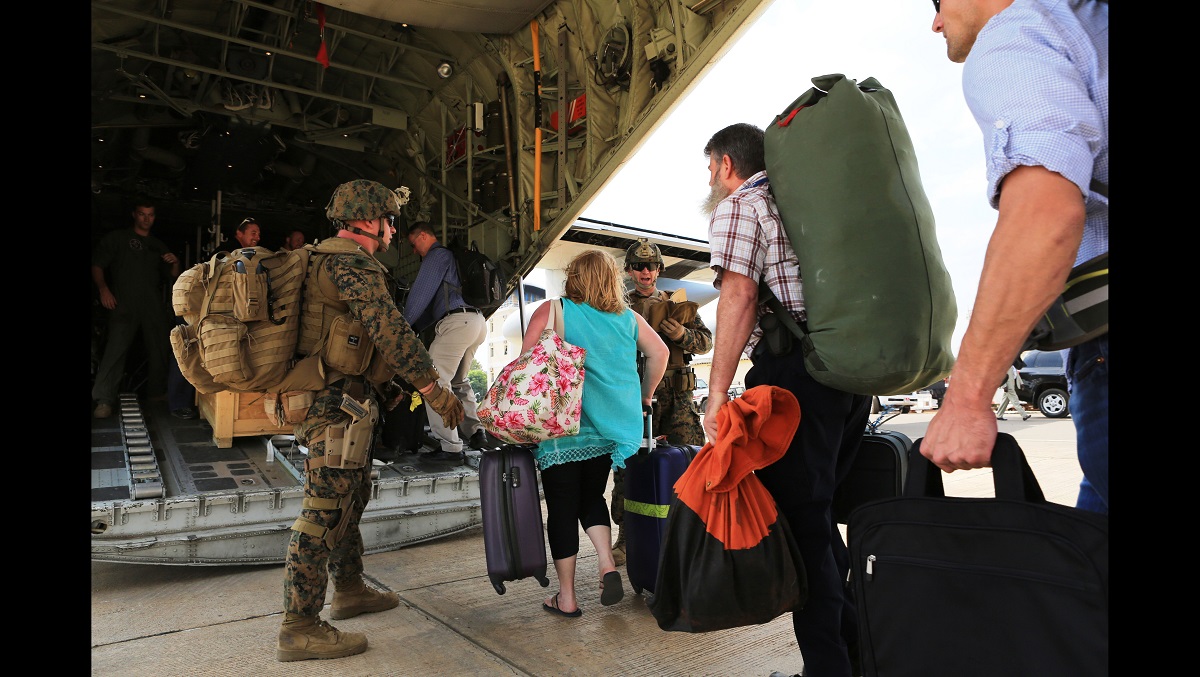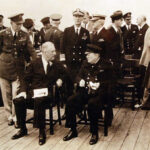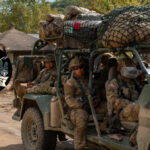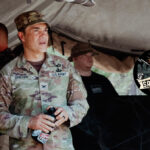
It’s time once again for a visit to the Wargaming Room. In this episode, three recent graduates of the AY23 Resident Course at the U.S. Army War College share the wargame they developed as part of the Carlisle Scholars Program. Giovanni Corrado, Ian Hopper and Kent Park are in the studio to discuss the impetus and goal of their Strategy Simulation Exercise. Joined by podcast editor Ron Granieri, the three game creators share how the exercise demonstrates how policy is made at many different levels. Using alliances, negotiations, political capital and timed periods, they’ve created a game that is an incredible teaching tool for a handful, a dozen, or even over a hundred students at a time.
We wanted to try to balance this effort to be curriculum-based; we wanted people to learn, but we also wanted people to have fun. It was a constant tension during our game development process between “we have to get these concepts in; we have to teach them about this,” but we also need to keep them engaged, and it needs to make sense in a gamified environment.
Podcast: Download
Subscribe: Apple Podcasts | Spotify | Amazon Music | Android | Pandora | iHeartRadio | Blubrry | Podchaser | Podcast Index | TuneIn | Deezer | Youtube Music | RSS | Subscribe to A Better Peace: The War Room Podcast
Giovanni Corrado is a colonel and an airborne infantry officer with a second specialty in intelligence in the Italian Army. He was an International Fellow, a member of the Carlisle Scholars Program and a graduate of the AY23 Resident Course at the U.S. Army War College.
Ian Hopper is a foreign service officer with the U.S Department of State. Most recently he was the director of the Office of Iraq Affairs. Ian served in Baghdad from 2019 to 2020 as Consul General and he previously served as the State Department’s Supervisory Regional Consular Officer based in Frankfurt, Germany. Since joining the foreign service in 2002 he has served in Jordan, India, Togo and the Philippines, as well as several Washington D.C.-based positions and in September he will become the Consul General in Port-au-Prince, Haiti. He was a member of the Carlisle Scholars Program and a graduate of the AY23 Resident Course at the U.S. Army War College.
Kent Park is a 1999 graduate of the United States Military Academy and colonel in the U.S. Army. He has served in a variety of command and staff positions in Korea and also in Iraq. Colonel Park attended the Harvard Kennedy School of Government and earned a master’s degree in public policy there, before returning to the U.S. Military Academy to teach American politics in the Department of Social Sciences. He was a member of the Carlisle Scholars Program and a graduate of the AY23 Resident Course at the U.S. Army War College.
Ron Granieri is Professor of History at the U.S. Army War College and the Editor of A BETTER PEACE.
The views expressed in this presentation are those of the speakers and do not necessarily reflect those of the U.S. Army War College, U.S. Army, or Department of Defense.
Photo Description: Marines and sailors with Special-Purpose Marine Air-Ground Task Force Crisis Response help U.S. citizens into a Marine Corps KC-130J Hercules airplane in Juba, South Sudan, during an evacuation of personnel from the U.S. Embassy, Jan. 3, 2014. A squad-size element of U.S. Marines from Special-Purpose Marine Air-Ground Task Force Crisis Response successfully evacuated more than 20 personnel from the U.S. Embassy in coordination with the East Africa Response Force, and under the command and control of Combined Joint Task Force-Horn of Africa. The Marines from Special-Purpose Marine Air-Ground Task Force Crisis Response are specifically trained for scenarios in which they provide support to a U.S. Embassy in the form of fixed-site security, embassy reinforcement, support to non-combatant evacuation, and other missions as directed.
Photo Credit: Staff Sgt. Robert L. Fisher III





I think it’s great that you’re interested in learning about war in a fun way. However, I believe that the creativity used to develop a game like this could be used to develop one on how to accomplish a Positive Peace, or how to solve other social problems like drug addiction or gun violence. There are other skills to learn in the USA beyond making war, and game creators could apply their talents to root social problems.
Games can be a powerful tool for learning and understanding complex issues. They surely can help us to see the world from different perspectives, to develop empathy for others, and to learn how to solve problems creatively. I believe that there is a need for more and improved games that focus on Positive Peace and social justice. These games can help us to imagine a better future and to work towards making it a reality. Winning or losing a war is only the start of new challenges.
Cheers!!